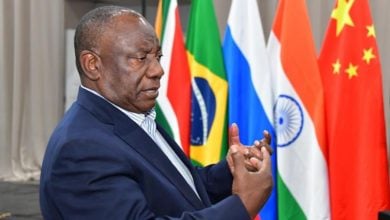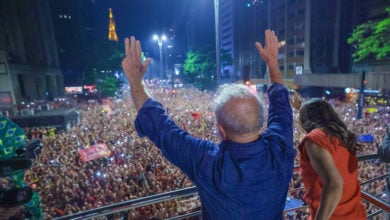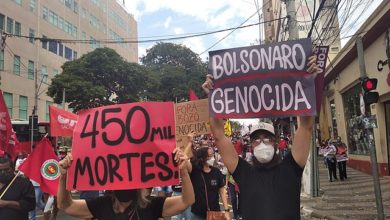This article is based on a talk given at a PSL forum on April 8.
“Não vai ter golpe! Vai ter luta!” (There won’t be a coup! There will be struggle!) was one of the slogans calling for demonstrations against the coup process in Brazil. But before I go into all that, I want to share a video with you. This is a seven minute clip from Al Jazeera talking about the role of the media in all this. It is fundamental to bring this up because the media a big force in what is going on in Brazil right now. You will see how the scenario is very similar to Venezuela in 2002, so let’s play it:
Brazil is facing a coup process, let’s make it clear from the beginning.
Because as this is happening, the golpistas, those who are conspiring to make the coup, will deny it and give many excuses and justifications for their actions. Corruption is one of the justifications, just like in 1964.
If this capitalist elite that is accusing Dilma really wanted to end corruption, they would start by arresting themselves.
Globo [the media monopoly behind the coup] has it’s name all over the Panama Papers. So corruption here is a pretext.
Parallels to Argentina and Venezuela
And before I explain what is happening in Brazil, I also would like to make sure everyone knows that there is a connection with that and what is happening in Venezuela and Argentina as well.
It is very important that people make these connections to understand what is happening in the region, because they are not isolated cases.
And the U.S. plays a role in all this. When Obama took office he said that Bush ignored the region too much. Now Obama is about to leave his second term in office and we see he did pay attention to the region, from the Honduras coup in 2009 until his visit last month to Cuba and Argentina.
Of course there are points of difference. Brazil is in the worst place to deal with this situation compared to Argentina and Venezuela.
Argentina had the “ley dos meios,” the media law that broke the monopoly of the media in that country, which was a big win for the democratization of information that Macri is destroying. Venezuela had a big political formation process of the working class led by Chávez. These situations are different from Brazil where the Workers Party has distanced itself from the base while focusing too much on pleasing the opposition forces.
But there is optimism now in Brazil, since March 31—when 2 million people took the streets on the anniversary of 1964 coup— we have seen an escalation of protest against the coup from different sectors of society.
Religious leaders, telenovela artists, singers, unions, students and many others are speaking out and mobilizing in the streets. I would say that the last time Brazil had so many sectors mobilized like this, was back in the 1980s when we were building a new constitution and there was a call for direct vote for the presidency.
But just having the people mobilized in the streets is not enough to stop a coup. Lets go back to Venezuela again in 2002, when the right with the capitalists tried a coup against Chávez.
The working class came out in the streets and surrendered the Miraflores palace. But forces from inside the government, the pro-Chávez military forces that took over the palace, were equally important to turn things around and bring Chávez back to power.
And this is something that we don’t know yet how it will play out in Brazil. How the leadership of the Workers Party, that is in the government, will act. And I say leadership because there is a division inside of the Party. There has always been since the first mandate of Lula.
Reviewing the history of the Workers Party
I was looking for analyses on the situation and I found a great talk from one of the PT’s leadership, Valter Pomar, presenting the mistakes of the leadership that didn’t prepare the party or the government for the escalation of the situation that we see now. It is the worst moment in the party’s history.
For us to understand all this, we need to review the past decade or so, because none of this started yesterday. This has been being orchestrated for a long time. The capitalist forces in Brazil never wanted the Workers Party in the government.
Brazil’s capitalist status quo can’t co-exist with democracy, not to mention the social democracy the PT wanted to implement.
To give you a perspective on what I am talking about, right now we are living the longest democratic period in Brazil’s history. And I am older than that. It had been 27 years since we voted for president in 1989, and I was 10 when those elections happened.
So, how did things develop into what is happening right now, what are the forces behind it, and what are the near future predictions for what’s next?
To help keep it short, lets split into two periods the years that the PT has been in power. You have the first period with Lula’s government, 2003 to 2010. And the second one with Dilma’s government, 2010 to now.
The offensive forces in Brazil, the opposition, the 1 percent of the country, never wanted the Workers Party in the government. The thing is that in this first period they were in a less favorable position because:
1. Brazil had yet to feel the effect of the 2008 economic crisis
2. On the other hand, it saw significant economic growth and the working class was benefiting from it via social benefit programs that distributed the wealth. (40 million people were lifted out of poverty and 30 million entered into the middle class.)
3. The ruling class was also benefiting from it, because of the concessions
4. And of course, Lula—as a charismatic figure—was a huge factor and made it is impossible to win against him in Brazil.
But there were attacks still. The 2006 reelection of Lula was full of attacks that resulted in two of the main leaders of the Workers Party sent to jail. Lula was re-elected despite Globo and the Supreme Federal Court media show against him and the PT.
What was different in the second period, was that the majority leadership of the party prepared a plan for Dilma’s government thinking it would be just like Lula’s second turn.
They thought the economic crisis wouldn’t hit the country as much, that with the World Cup and the Olympics the decade was guaranteed. The country would see enough money circulating to keep its economy growing.
And none of that happened. Dilma created a government with more concessions to the opposition forces than Lula; pushing away the social movements, which is a great part of its base.
The crisis hurt the poor, unemployment went up, food prices went up. And then you had the protests of 2013, before the World Cup.
And from there the offensive forces started the same script they did in Venezuela, seeking to create a state of destabilization in the country, to make it ungovernable.
The media used all its power calling people to go out in the streets against Dilma and the PT. This woke up a group that is extremely intolerant and violent, this upper middle class that is super extreme rightwing.
PT election victory infuriated the right wing
The protests continued along with the corruption scandal propaganda and the right thought that in 2014 they would win the elections. But they lost it, by a small margin with Dilma getting 52 percent of the votes.
And that just pissed them off completely. They left the elections already calling them invalid, and they started building up the impeachment idea continuing throughout 2015. In December, the president of the lower House accepted the request for impeachment of Dilma in retaliation against the PT who had voted for his deposition due to corruption.
Dilma is the only person that never had a charge placed against her. Everyone else around this story has some charge or has been found to be connected somehow.
The social movements took it to the streets with big demonstrations on December 16, 2015. But the government went on to make more concessions to the opposition.
And this time, the opposition saw a pattern and they saw they had the advantage. So they started 2016 pushing forward. They had Dilma, now they went for Lula. Let’s fix today and 2018 in one move, they thought.
Who are they? They are the traditional rightwing parties, the organized fascist and extreme right groups, who have attacked offices from left parties and killed people. The media, a great part of the judiciary system and the police, the CEOs and businessmen, and of course, the international interests—the U.S. and its multinationals.
What do they want? First, they want to take Brazil out of the BRICS and Latin America alliances and bring it closer to the United States. Then, they want to destroy all social benefits and re-implement neoliberalism.
But that vision is unsustainable. Because if the right are the ones in the government with the level of mobilization that we are seeing right now in different sectors of society—in the unions, CUT, the Workers Party—out there mobilizing with the social movements, people will fight. So they will also have to destroy the social movements, the unions, the students movements and so on.
So we will see a very intense offensive coming against the left. And it is already happening. There was an arrest warrant against the MTST (Homeless Workers’ Movement) leadership.
But to be honest, I don’t know what is coming next in Brazil. This is what they are looking to do, but there are multiple ends to this story and we have seen in the past processes that were capable of stopping a coup.
Things are still developing and there are even discussions from both sides about calling for anticipation of elections.
The Brazilians are paying attention. The population that didn’t go out to the streets for either side, which is the majority, is watching. And they definitely don’t want the strategy that the opposition is offering, and they are also very worried about having this violent right wing that is in the streets controlling the country. So I strongly believe that the people will continue to fight it.
What you can do? You can denounce the intervention of the United States in Latin America. The best thing anyone in the United States can do for the situation in Brazil, is to change the situation here in this country.
This is what the Party for Socialism and Liberation is doing, while promoting solidarity with Latin America, we are here fighting to change the system from within the belly of the beast. And you can be part of it as well, so come join us.





